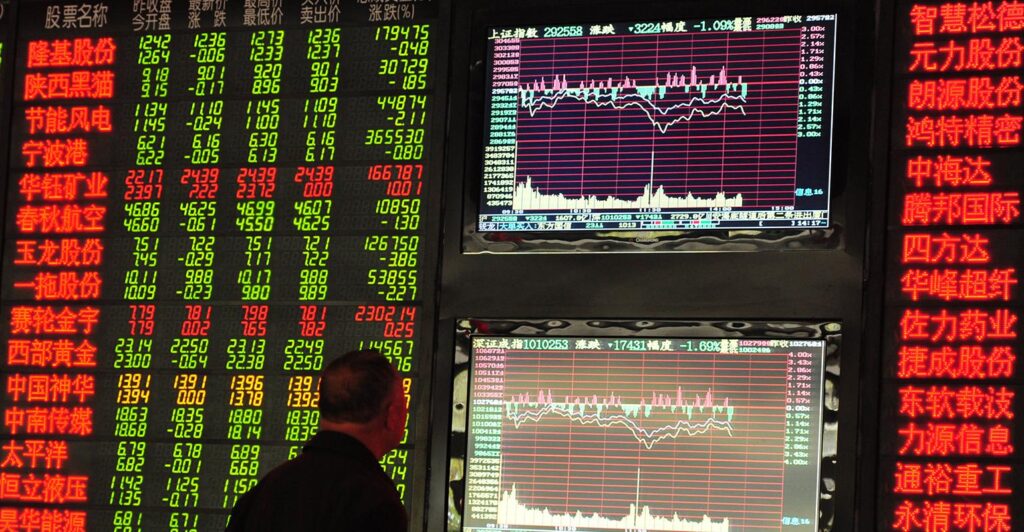The Chinese stock market is increasingly becoming one of the favorite destinations of foreign investors because the country’s economy is developing at a fast pace, and the financial market and corporate environment also look favorable for new investors. According to the latest data, the Chinese stock market, including Shenzhen Stock Exchange and Shanghai Stock Exchange, is valued at more than $10 trillion. It has already surpassed the Japanese stock market because of its high economic growth. So, reading this article will give you some crucial insights if you are an investor willing to invest in China’s well-known companies.
How Does the Chinese Stock Market Work?
Before investing in the Chinese stock market, you must know about its stock markets and how it regulates them. China has two major stock exchanges: Shanghai Stock Exchange (SSE) and Hong Kong Stock Exchange (HKEx). However, Shanghai Stock Exchange (SSE) is one of the largest stock exchanges in China’s mainland area. China’s stocks, bonds, and other securities are traded in this stock market. According to its market capitalization, the world’s one of the largest stock markets. This stock exchange aims to provide a proper, transparent, and efficient ecosystem so traders, investors, and companies can freely execute their trading activities. To get listed in this stock market, the ideal company must show at least the last three years’ profit earning report.
The Hong Kong Stock Exchange, one of Asia’s largest stock exchanges, stands behind the Shanghai Stock Exchange and Tokyo Stock Exchange. It allows investors to trade in equity-linked securities, bonds, mutual funds, stocks, and even warrants. There is a certain requirement that the company willing to list has to fulfill first. A major requirement is that the selected company should be earning at least HK $30 million as profit from the last two years.

How to Invest in China Stock Market From India?
If you want to invest in the Chinese stock market, you will require to find a stock broker that provides this facility and open your trading account to execute in SSE and HKEx. However plenty of brokers are providing this service, but when choosing one, ensure you get better customer support and proper insights about the market trends along with easy-to-use options to initiate trade.
In addition, many internationally recognized stock brokers allow their investors to invest in various securities listed in China’s stock market. For example, you can invest in currency pairs, CFDs, and metals. Moreover, these platforms have several partner banks to help you open your account and easily add funds to your trading account. This will also help you withdraw your money at fewer charges than a local broker may charge you. By pickup up the ideal broker to open your trading account to trade and invest in the Chinese stock market, you will be able to invest in various industries, including finance, telecommunication, transport, and even energy.
In Which Securities Can One Invest in the Chinese Stock Market?
For international investors, there are comparatively limited opportunities to invest in China and its stock market. Below are two categories where you can easily invest your money.
Mutual Funds & ETFs
It has a wider range of ETFs or Exchange Traded Funds, which are often considered one of the most promising investment options in the Chinese stock exchange. Additionally, there are many types of mutual funds available for investors to invest in. If you are unfamiliar with ETFs, you must know that these are mutual funds and mostly invest your money in an index or market instead of a particular stock. If we talk about China based ETFs, you will find Alibaba Group Holding Ltd and JD.com at the top position. The popular Chinese ETFs are iShare MSCI China ETF and SPDR S&P China ETF, available on NYSE: GXC.
ADRs
ADRs are the most common term used in the stock market and represent American Depositary Receipts. If you are an Indian NRI living in the US, you can buy the Chinese company’s stock listed in the US stock market. Use your existing stockbroker and purchase the desired number of ADRs based on your budget. You can even look at IDRs to find any opportunity to buy international stocks. Some of the popular Chinese ADRs are Baidu Inc. And China Mobile Ltd.
What is the Risk of Investing in the Chinese Stock Market?
There is some risk linked with trading in the Chinese stock market. Below is some brief information you must know if you are considering investing in it.
Lack of Information
To make an informed investment decision, you need to get quick updates about the latest news and updates within the region. If you are investing in the Chinese stock market, you will require access to the latest update as soon as possible. But due to tough policies put by the Chinese government, fewer resources might be available for foreign investors.
Imbalance in Society
Almost 1% richest Chinese hold over 33% of the nation’s total income, whereas 25% poorest have less than 2% of household income. The improper income distribution may affect social unrest and capital outflow, negatively impacting the trade you execute in its stock market.
Aging Factor
The reason for China’s fast economic growth is a cheap workforce and a young population. However, with years, this population will get old. As a result, it may affect this country’s productivity, manufacturing, and economic growth.
Conclusion
Investing in China has pros and cons if you are willing to invest here. However, before you start, getting a trading and Demat account from a trusted broker with a good bank and customer support is crucial. You should also find credible sources to find crucial information about the Chinese stock market to make proper investment decisions and make a profit. We hope you have a clear idea of how to invest in the Chinese stock market from India. If you have any doubts, you can feel free to ask us in the comment section.
